Special Report
The Least and Most Popular NFL Teams
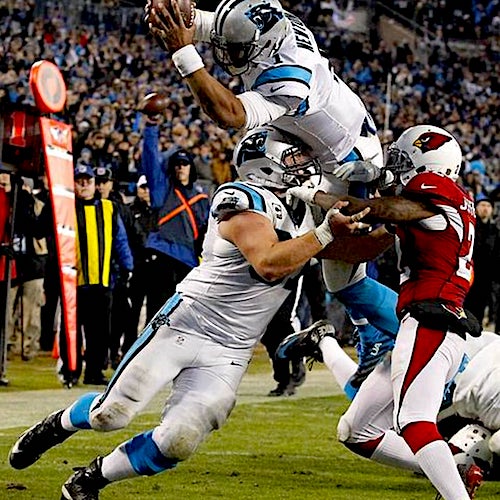
Published:
Last Updated:

When the NFL season officially begins, the Chargers will have their first season in Los Angeles after more than 55 years of playing in San Diego. The Chargers are the second team to move to the city in as many years, after the Rams moved from St. Louis in 2016. Both teams likely moved to improve on weak attendance figures. Last month, the NFL approved the Oakland Raiders’ planned move to Las Vegas in 2019.
The National Football League is a business, as are its franchises. While fans hope that owners prioritize winning and a relationship with the fan base over anything, management’s priority first and foremost is to sell tickets. Winning tends to fill seats, which might partly explain the poor attendance in Oakland, San Diego, and St. Louis.
The NFL is the most popular American sport, and while viewership is down, pro football franchises typically do not suffer from attendance issues that plague some other sports. For example, in over 10 MLB teams at least one-third of seats on average were empty at home games in 2015. In the NFL, there is still a fair amount of variation between teams, and poor attendance, and poor attendance can drive owners to take their business to markets where they believe they will find greater success.
While a number of highly popular teams regularly fill stadiums beyond the listed capacity, others average less than 90% capacity at home games, This can be concerning considering that each team only hosts eight regular season home games. Ticket prices are from TicketIQ
Click here to see the most and least popular NFL teams.
Click here to see the detailed findings.

32. Los Angeles Chargers
> 2016 pct. stadium filled: 80.0% capacity
> 2016 avg. home attendance: 57,024
> 5-year record: 34W/46L/0T
> Home stadium: StubHub Center – Carson, CA
> 2017 avg. ticket price: $252
With the lowest average stadium attendance of any NFL team in 2016, the Chargers in January announced they will move to Los Angeles for the 2017 season. The Chargers played in San Diego for 56 years, never winning the Super Bowl.
[in-text-ad]
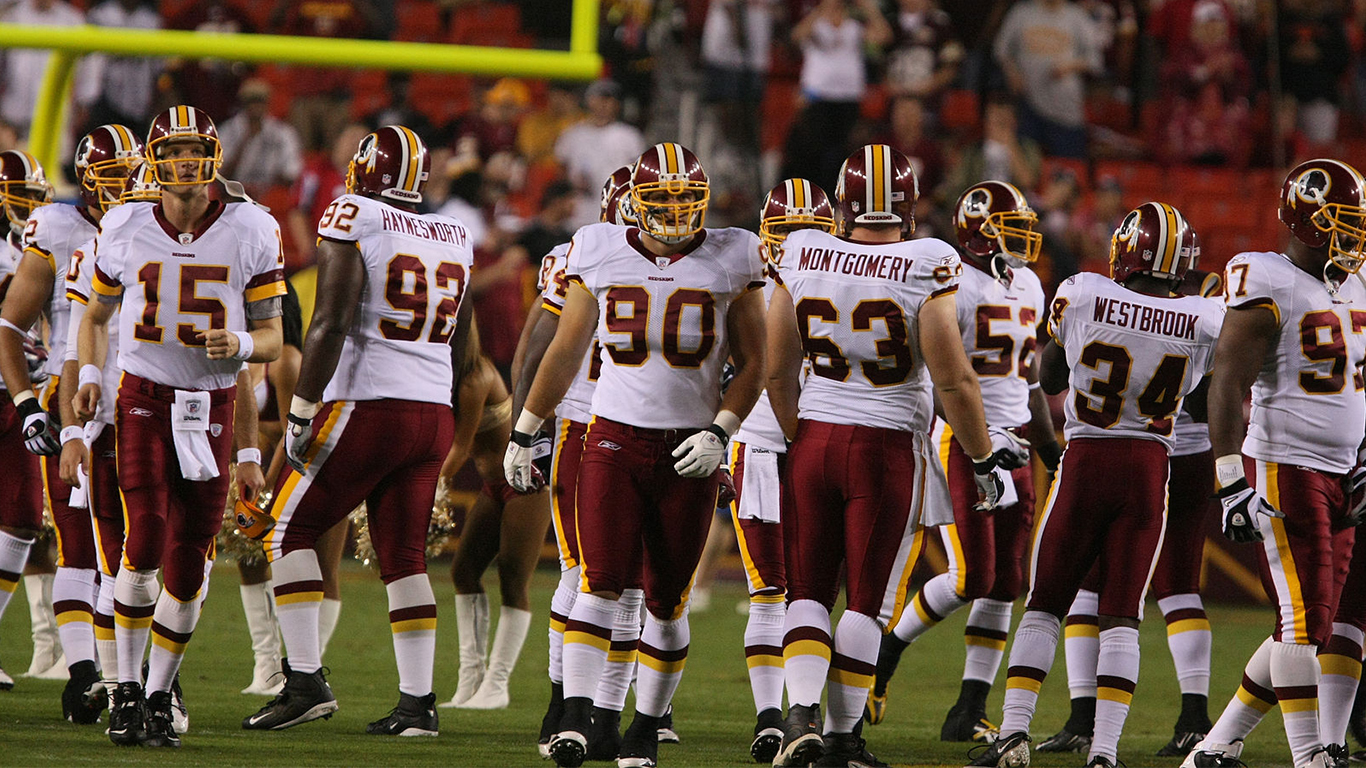
31. Washington Redskins
> 2016 pct. stadium filled: 85.4% capacity
> 2016 avg. home attendance: 78,304
> 5-year record: 34W/45L/1T
> Home stadium: FedExField – Landover, MD
> 2017 avg. ticket price: $229
Often criticized for their team name and controversial mascot, the Washington Redskins struggled to fill seats in the 2016 season. In addition, the team in March 2016 released the once-promising young quarterback and 2012 offensive rookie of the year award winner, Robert Griffin III.

30. Oakland Raiders
> 2016 pct. stadium filled: 86.6% capacity
> 2016 avg. home attendance: 54,584
> 5-year record: 30W/50L/0T
> Home stadium: Oakland–Alameda County Coliseum – Oakland, CA
> 2017 avg. ticket price: $275
Though the NFL approved earlier this year the Raiders’ plan to move to Las Vegas, the team will continue to play in Oakland for the 2017 season. The effect of the impending move on attendance remains to be seen.

29. Cleveland Browns
> 2016 pct. stadium filled: 87.9% capacity
> 2016 avg. home attendance: 64,311
> 5-year record: 20W/60L/0T
> Home stadium: FirstEnergy Stadium – Cleveland, OH
> 2017 avg. ticket price: $184
Coming off the March 2016 dismissal of their once promising first round draft pick quarterback Johnny Manziel — and with no playoff appearances in over a decade — the Cleveland Browns had more trouble filling seats in 2016 than the majority of teams in the league.
[in-text-ad-2]
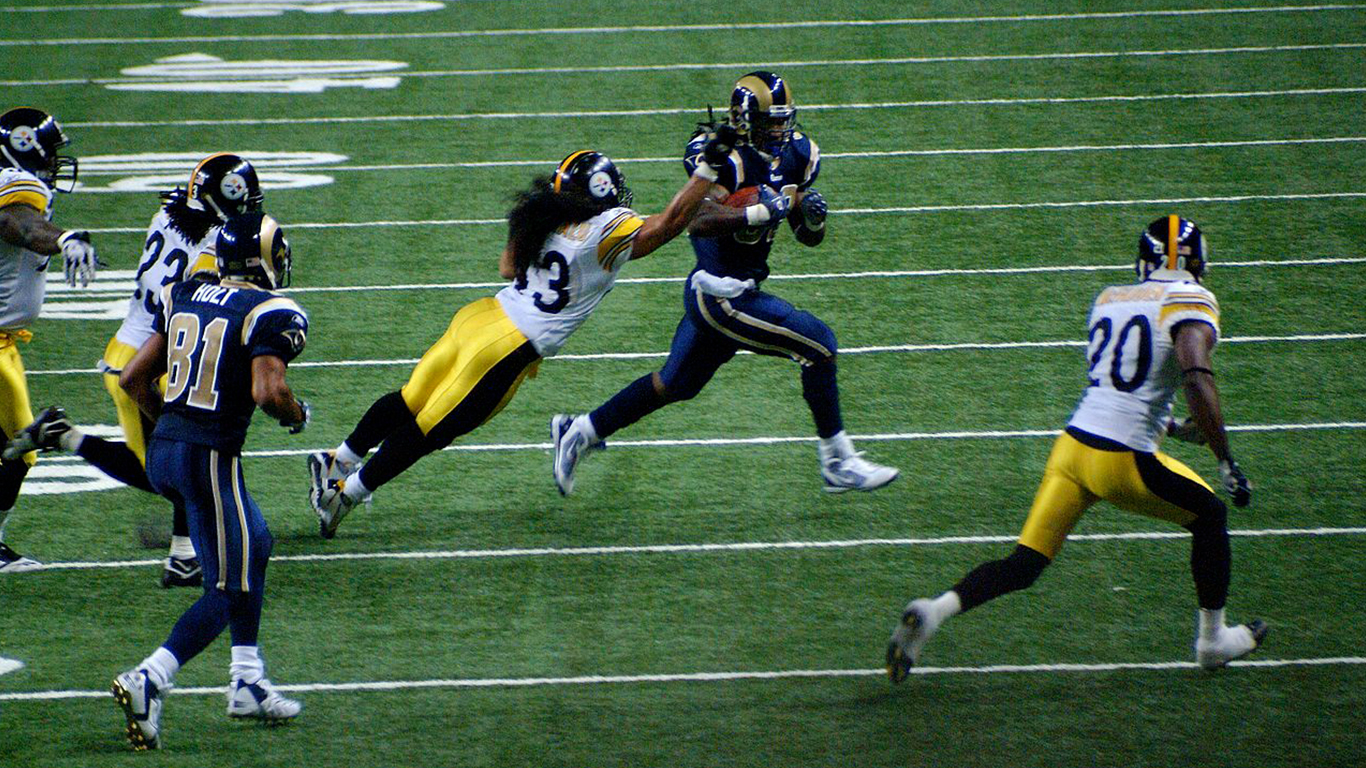
28. Los Angeles Rams
> 2016 pct. stadium filled: 89.8% capacity
> 2016 avg. home attendance: 74,121
> 5-year record: 31W/48L/1T
> Home stadium: Los Angeles Memorial Coliseum – Los Angeles, CA
> 2017 avg. ticket price: $258
After 21 years in St. Louis, the Rams played in their new home city of Los Angeles for the first time in 2016. Los Angeles has not had a professional football team in 21 years, and it appears it may take time for area residents’ interest to into sellout games.
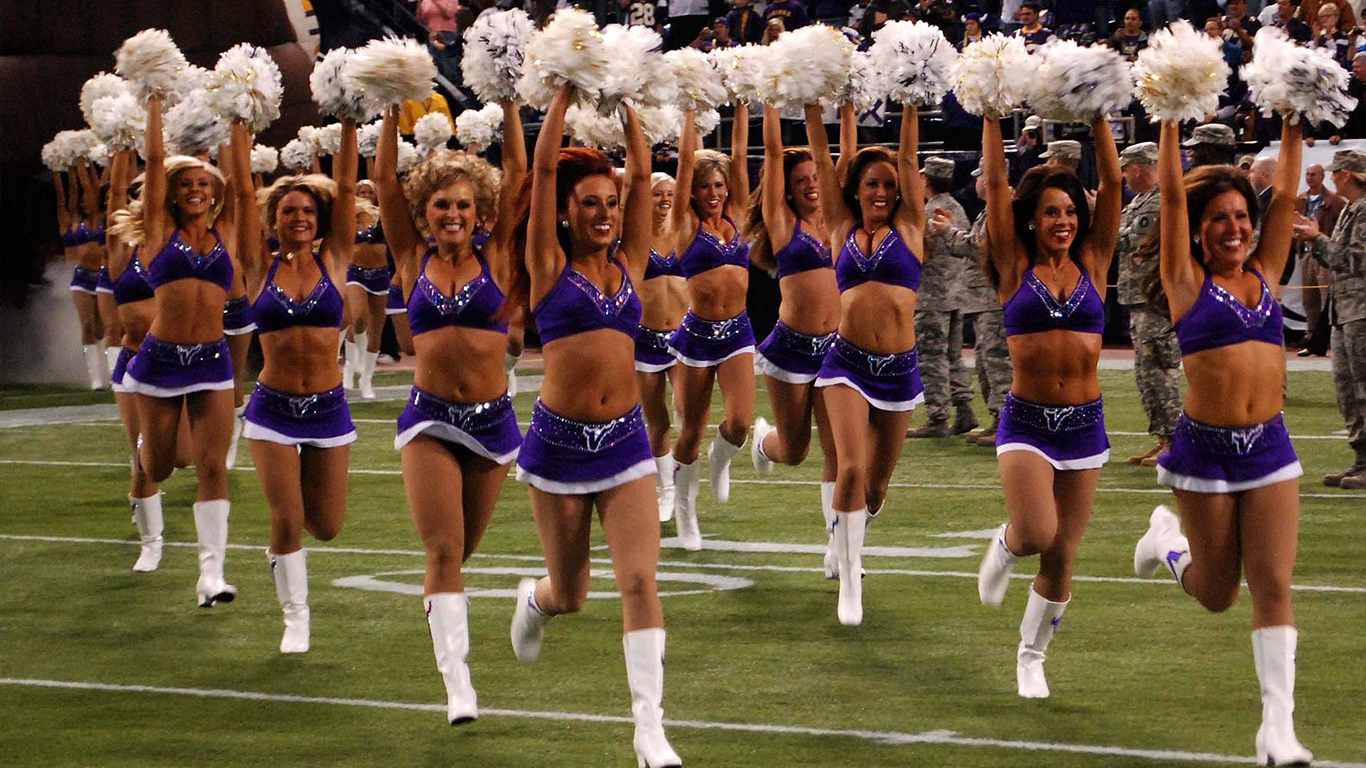
27. Minnesota Vikings
> 2016 pct. stadium filled: 91.5% capacity
> 2016 avg. home attendance: 66,786
> 5-year record: 41W/38L/1T
> Home stadium: U.S. Bank Stadium – Minneapolis, MN
> 2017 avg. ticket price: $242
The 2016 season was a disappointing one for Vikings fans. Coming off the high of a five-game winning streak in the first five weeks, the Vikings managed only three more wins in the following 11 games.
[in-text-ad]

26. Jacksonville Jaguars
> 2016 pct. stadium filled: 92.2% capacity
> 2016 avg. home attendance: 61,915
> 5-year record: 17W/63L/0T
> Home stadium: EverBank Field – Jacksonville, FL
> 2017 avg. ticket price: $133
Even after a 3.6% price increase in 2016, the Jacksonville Jaguars have some of the least expensive tickets in the NFL. Despite the relative bargain, the Jaguars struggled to fill the stadium to capacity last season.
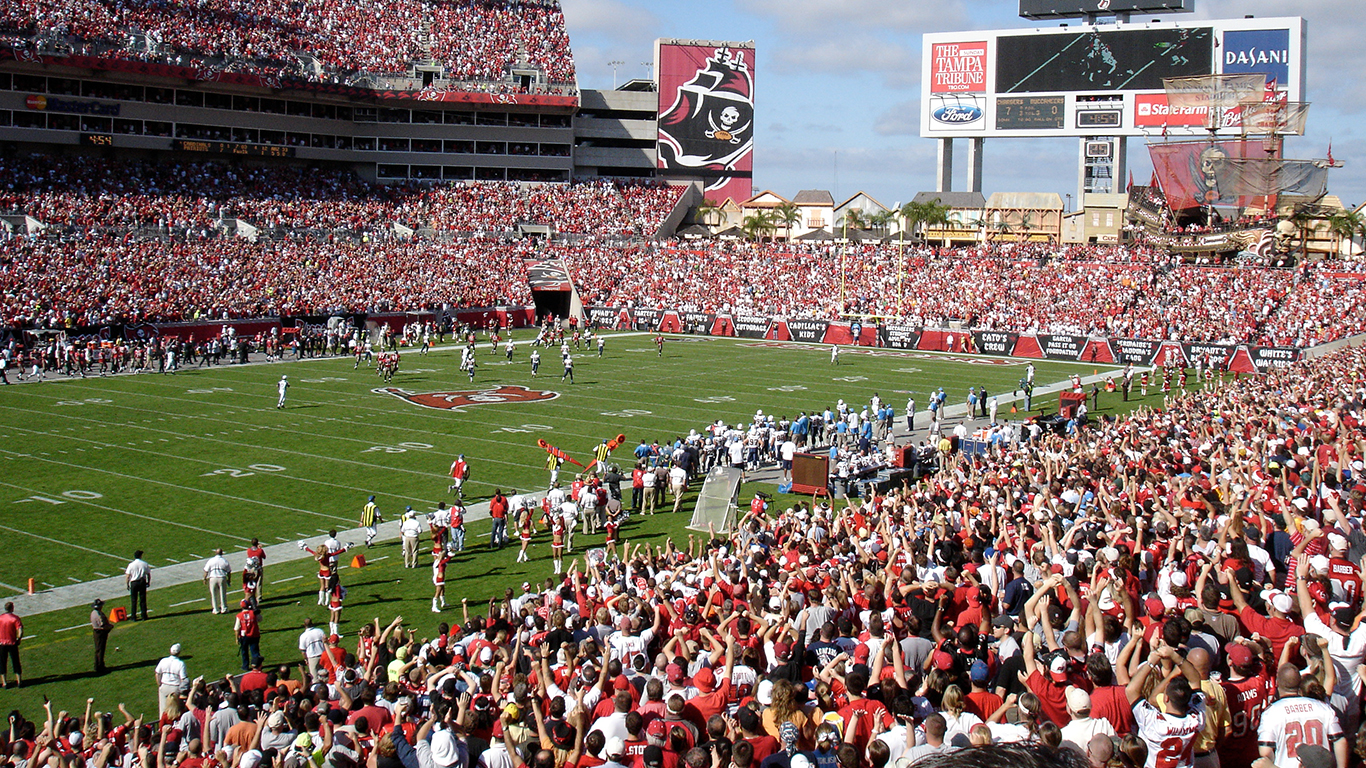
25. Tampa Bay Buccaneers
> 2016 pct. stadium filled: 92.3% capacity
> 2016 avg. home attendance: 60,624
> 5-year record: 28W/52L/0T
> Home stadium: Raymond James Stadium – Tampa, FL
> 2017 avg. ticket price: $276
Last year’s 9-7 season was the first winning season Tampa Bay has had since 2010. Including an abysmal 2-14 season in 2014, the team has had four seasons of 4 wins or less in the last decade.

24. Cincinnati Bengals
> 2016 pct. stadium filled: 92.4% capacity
> 2016 avg. home attendance: 60,511
> 5-year record: 49W/29L/2T
> Home stadium: Paul Brown Stadium – Cincinnati, OH
> 2017 avg. ticket price: $164
Cincinnati Bengals fans may be tired of having their hopes dashed. The team lost in the first round of the playoffs after strong regular season performances in five of the last six seasons.
[in-text-ad-2]
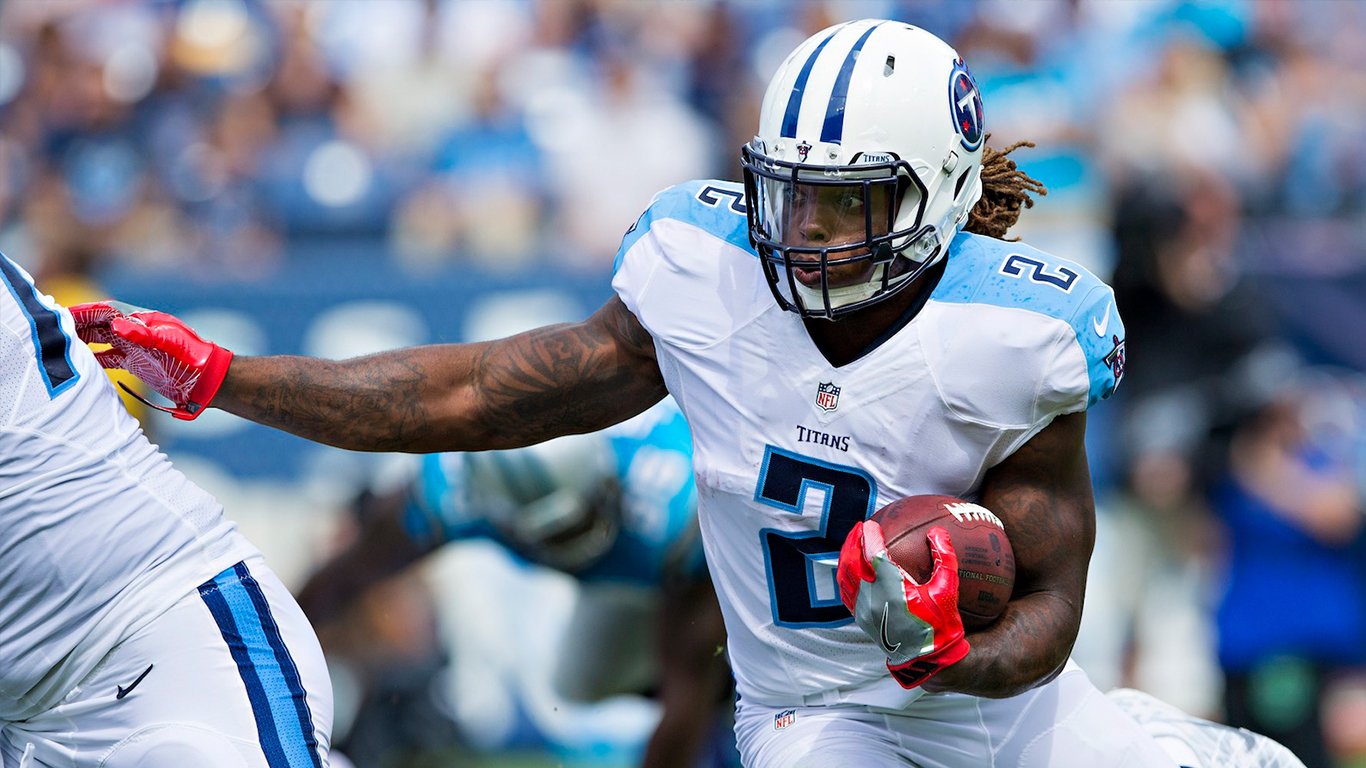
23. Tennessee Titans
> 2016 pct. stadium filled: 93.5% capacity
> 2016 avg. home attendance: 64,659
> 5-year record: 27W/53L/0T
> Home stadium: Nissan Stadium – Nashville, TN
> 2017 avg. ticket price: $190
Tennessee picked up quarterback Marcus Mariota second overall in the 2015 draft, with hopes the Oregon alumnus would become the face of the franchise and help the Titans return to winning ways. Last year, the team had their first winning season since 2011.
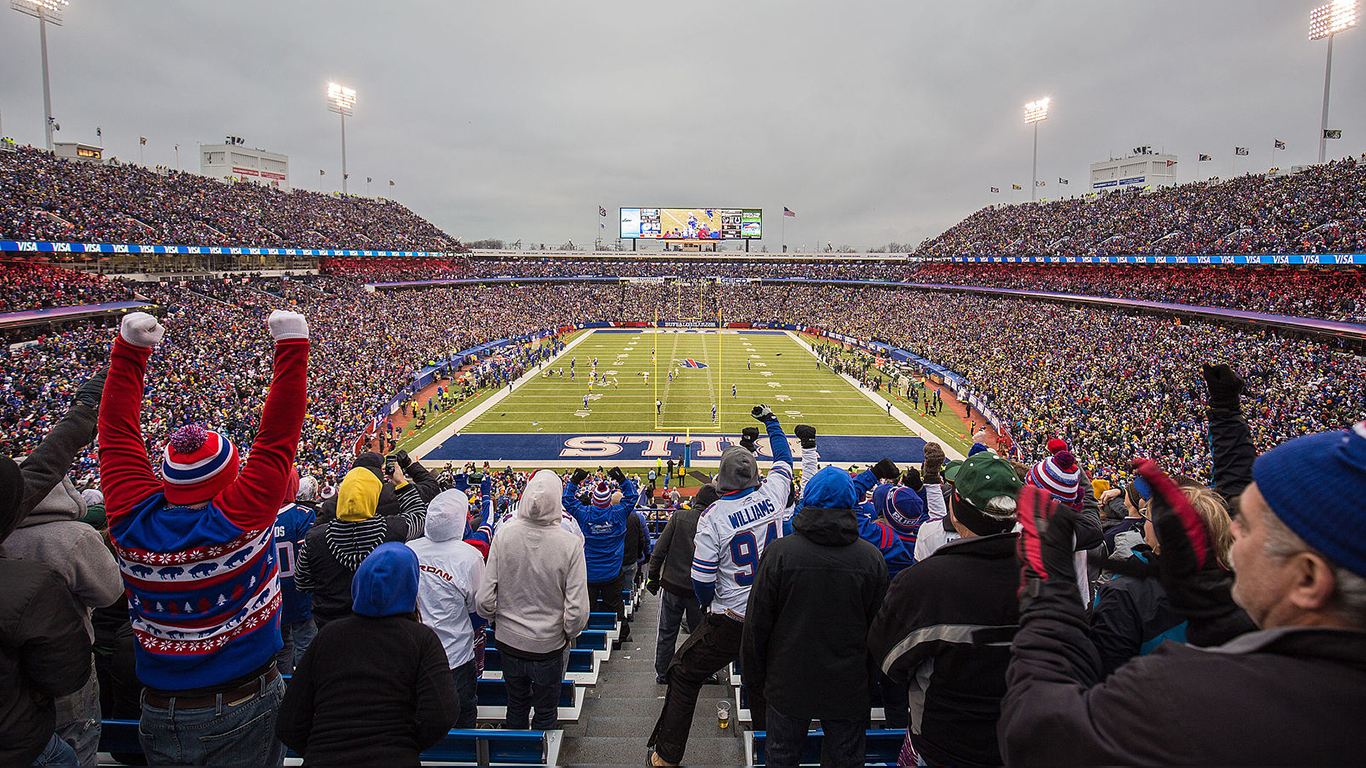
22. Buffalo Bills
> 2016 pct. stadium filled: 93.7% capacity
> 2016 avg. home attendance: 68,509
> 5-year record: 36W/44L/0T
> Home stadium: New Era Field – Orchard Park, NY
> 2017 avg. ticket price: $134
The Buffalo Bills finished their losing 2016 season by firing controversial head coach Rex Ryan after he led the team for two years. Ryan’s departure from the team marked the end of the Bill’s 17th season without a playoff appearance.
[in-text-ad]
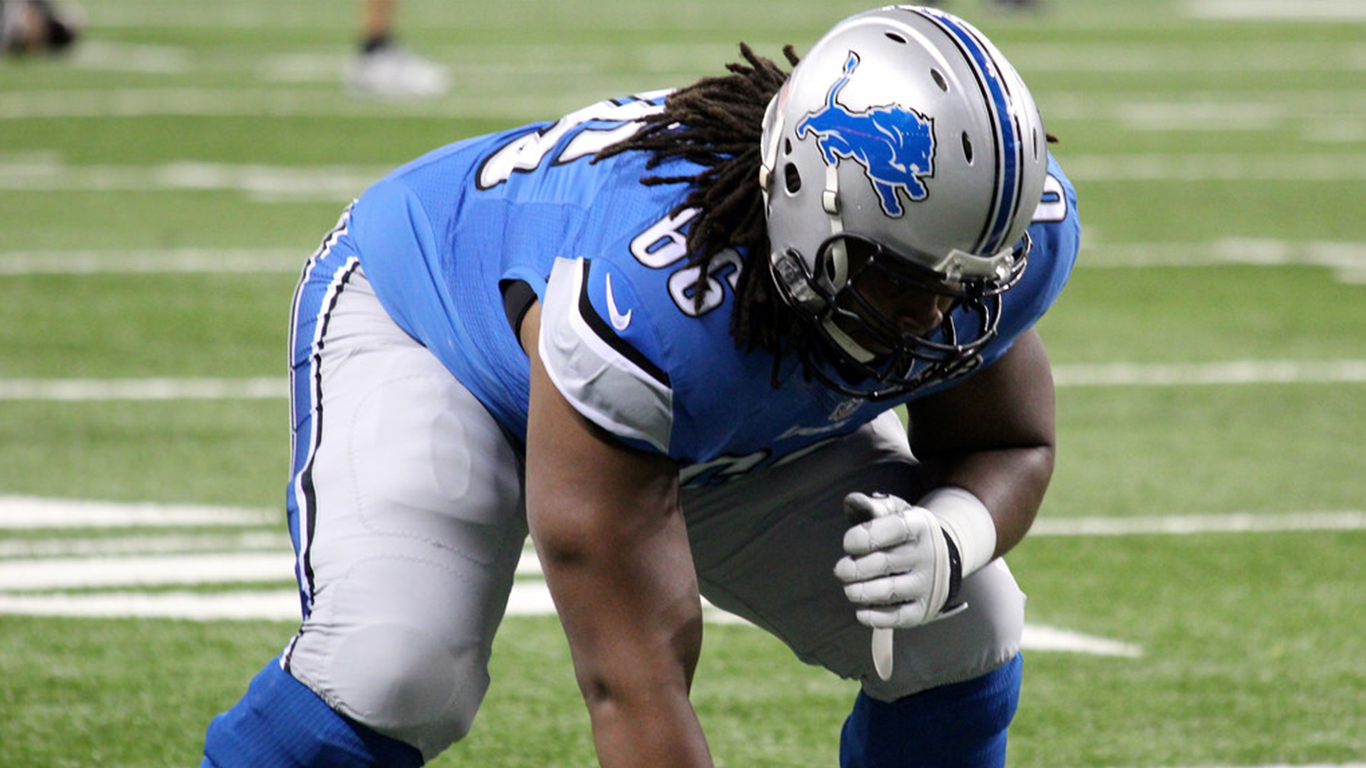
21. Detroit Lions
> 2016 pct. stadium filled: 94.3% capacity
> 2016 avg. home attendance: 60,792
> 5-year record: 38W/42L/0T
> Home stadium: Ford Field – Detroit, MI
> 2017 avg. ticket price: $199
The Lions have some bad years under their belt, including the team’s history-making 0-16 season in 2008. While the team has improved since then, Detroit is perhaps a less than ideal market — metro area’s population has been declining for decades.
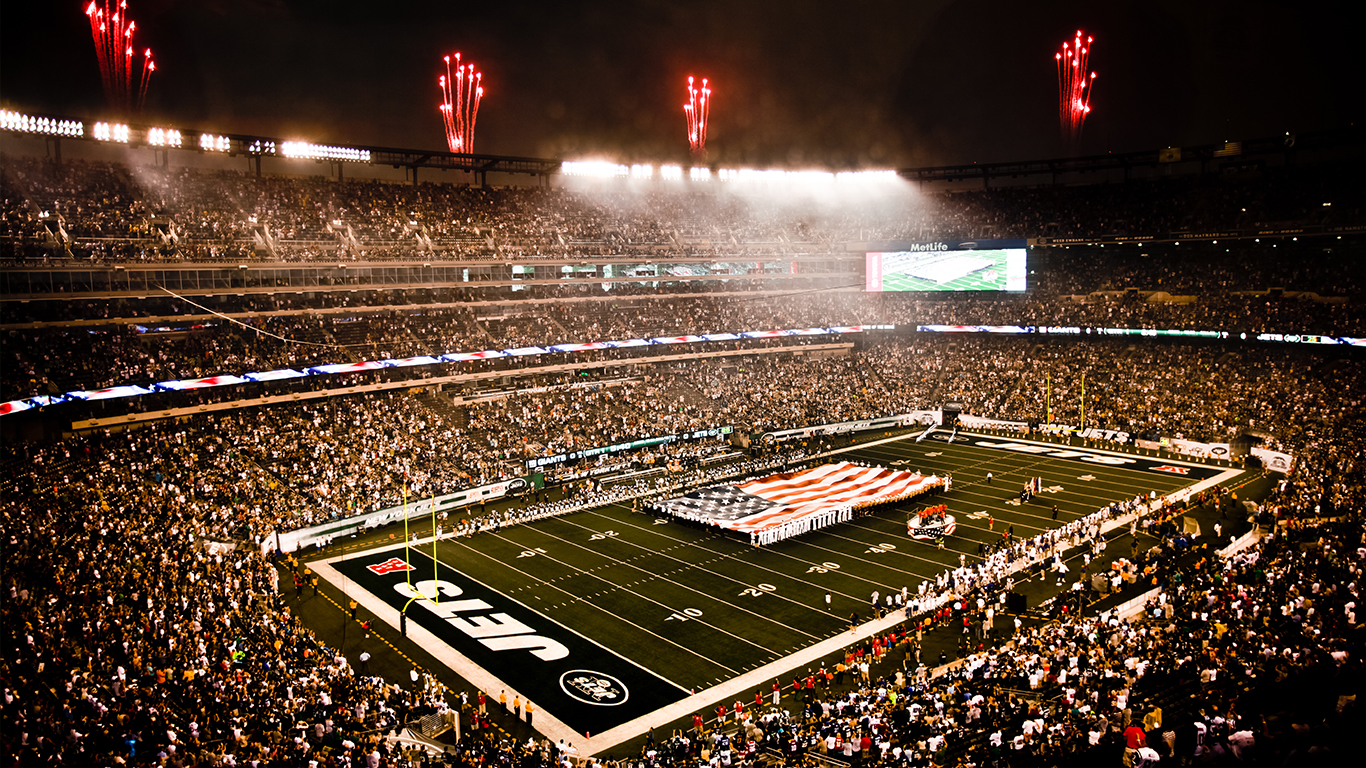
20. New York Jets
> 2016 pct. stadium filled: 94.7% capacity
> 2016 avg. home attendance: 78,160
> 5-year record: 33W/47L/0T
> Home stadium: MetLife Stadium – East Rutherford, NJ
> 2017 avg. ticket price: $204
The Jets, which share MetLife Stadium with the Giants, fell slightly behind their co-inhabitants in filling the stadium last season, at an average of 94.7% of all home games in 2016 compared to the Giants’ 95.5%. This may not be surprising considering the Giants had an 11-5 season, while the Jets went 5-11.

19. Kansas City Chiefs
> 2016 pct. stadium filled: 95.5% capacity
> 2016 avg. home attendance: 73,328
> 5-year record: 45W/35L/0T
> Home stadium: Arrowhead Stadium – Kansas City, MO
> 2017 avg. ticket price: $214
Arguably no team has had a greater reversal of fortune in the past five years. The team finished 2012 with a 2-14 record. The Chiefs went 11-5 or better in three of the next four years, including a 12-4 record last year, tied for third best in the league.
[in-text-ad-2]
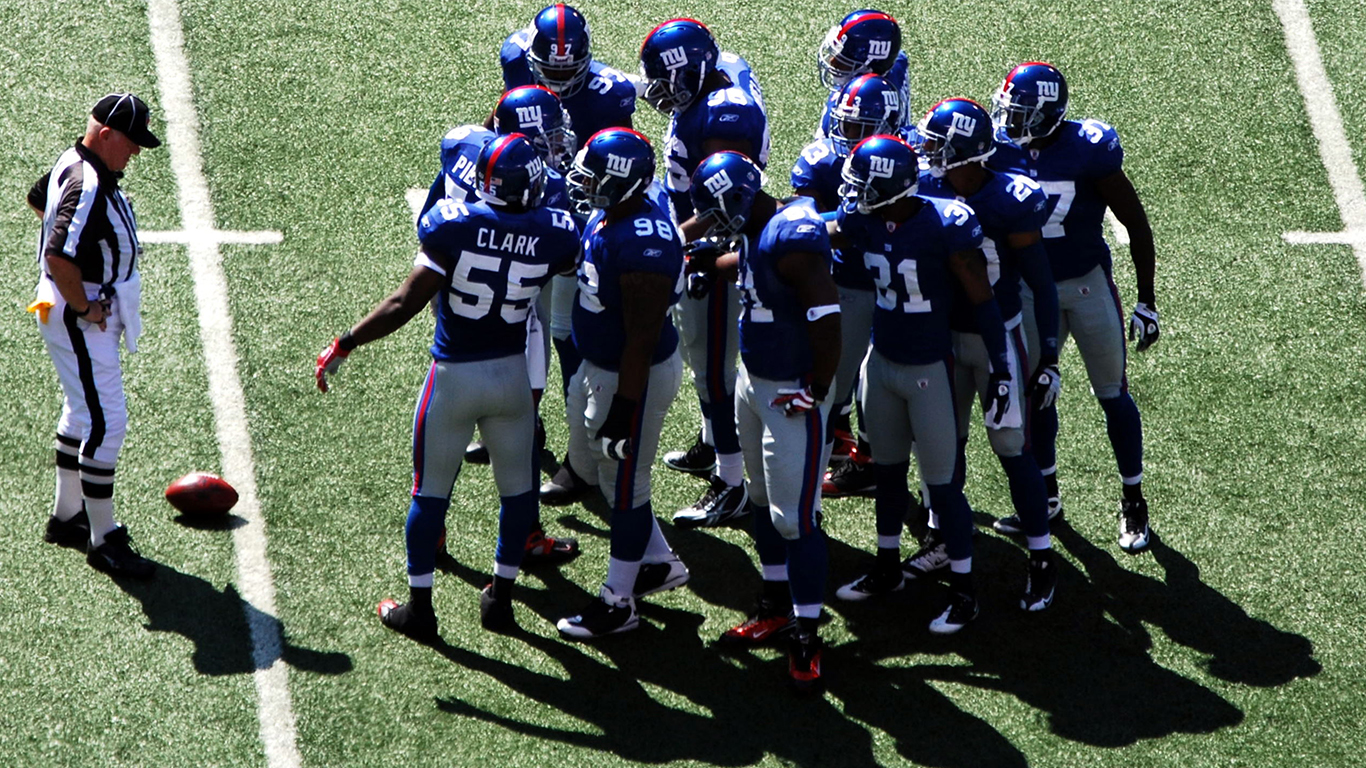
18. New York Giants
> 2016 pct. stadium filled: 95.5% capacity
> 2016 avg. home attendance: 78,789
> 5-year record: 39W/41L/0T
> Home stadium: MetLife Stadium – East Rutherford, NJ
> 2017 avg. ticket price: $312
New York is the largest metropolitan area in the country with over 20 million people. The metro area can easily accommodate two football teams — the Jets and the Giants. With the help of one of the most exciting players in the league in the form of Odell Beckham, the Giants filled slightly more seats than the Jets.

17. New England Patriots
> 2016 pct. stadium filled: 97.2% capacity
> 2016 avg. home attendance: 66,829
> 5-year record: 62W/18L/0T
> Home stadium: Gillette Stadium – Foxborough, MA
> 2017 avg. ticket price: $670
It may surprise some to see the Patriots, one of the winningest franchises in NFL history, only rank 17th in attendance. The team won two Super Bowls in the last three years and has won at least 12 games per season in each of the last eight.
[in-text-ad]

16. Atlanta Falcons
> 2016 pct. stadium filled: 98.2% capacity
> 2016 avg. home attendance: 69,999
> 5-year record: 42W/38L/0T
> Home stadium: Mercedes-Benz Stadium – Atlanta, GA
> 2017 avg. ticket price: $396
Led by quarterback Matt Ryan, the Atlanta Falcons went 11-5 in their 2016 season. Facing off in the Super Bowl against the AFC division-leading New England Patriots, the Falcons were up 28-3 at the half, only to lose the game in overtime after the Patriots staged a dramatic comeback.

15. Chicago Bears
> 2016 pct. stadium filled: 98.2% capacity
> 2016 avg. home attendance: 60,368
> 5-year record: 32W/48L/0T
> Home stadium: Soldier Field – Chicago, IL
> 2017 avg. ticket price: $309
Initially named the Decatur Staleys, the Chicago Bears are one of the oldest and most storied franchises in the NFL. The team also has one of the largest markets of any professional sports team in the country.
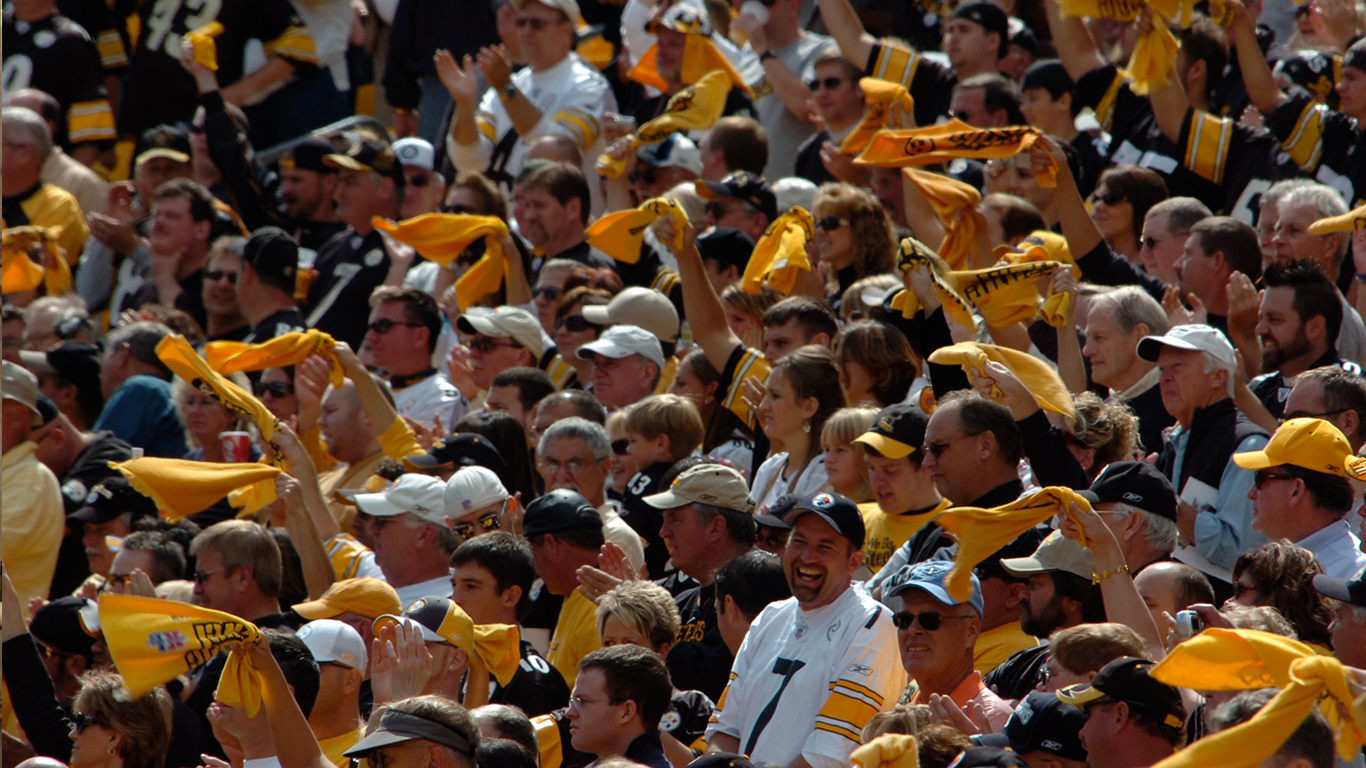
14. Pittsburgh Steelers
> 2016 pct. stadium filled: 98.9% capacity
> 2016 avg. home attendance: 64,312
> 5-year record: 48W/32L/0T
> Home stadium: Heinz Field – Pittsburgh, PA
> 2017 avg. ticket price: $311
The Steelers have been one of the more successful NFL teams in recent years, missing the playoffs just five times since 2001 and winning two Super Bowls during that time.
[in-text-ad-2]

13. Carolina Panthers
> 2016 pct. stadium filled: 100.0% capacity
> 2016 avg. home attendance: 73,792
> 5-year record: 47W/32L/1T
> Home stadium: Bank of America Stadium – Charlotte, NC
> 2017 avg. ticket price: $236
One of the newest teams in the league, the Carolina Panthers formed in 1993. Lead by charismatic and controversial quarterback Cam Newton, the Panthers only went 6-10 in the 2016 season after losing Super Bowl 50 the previous season.
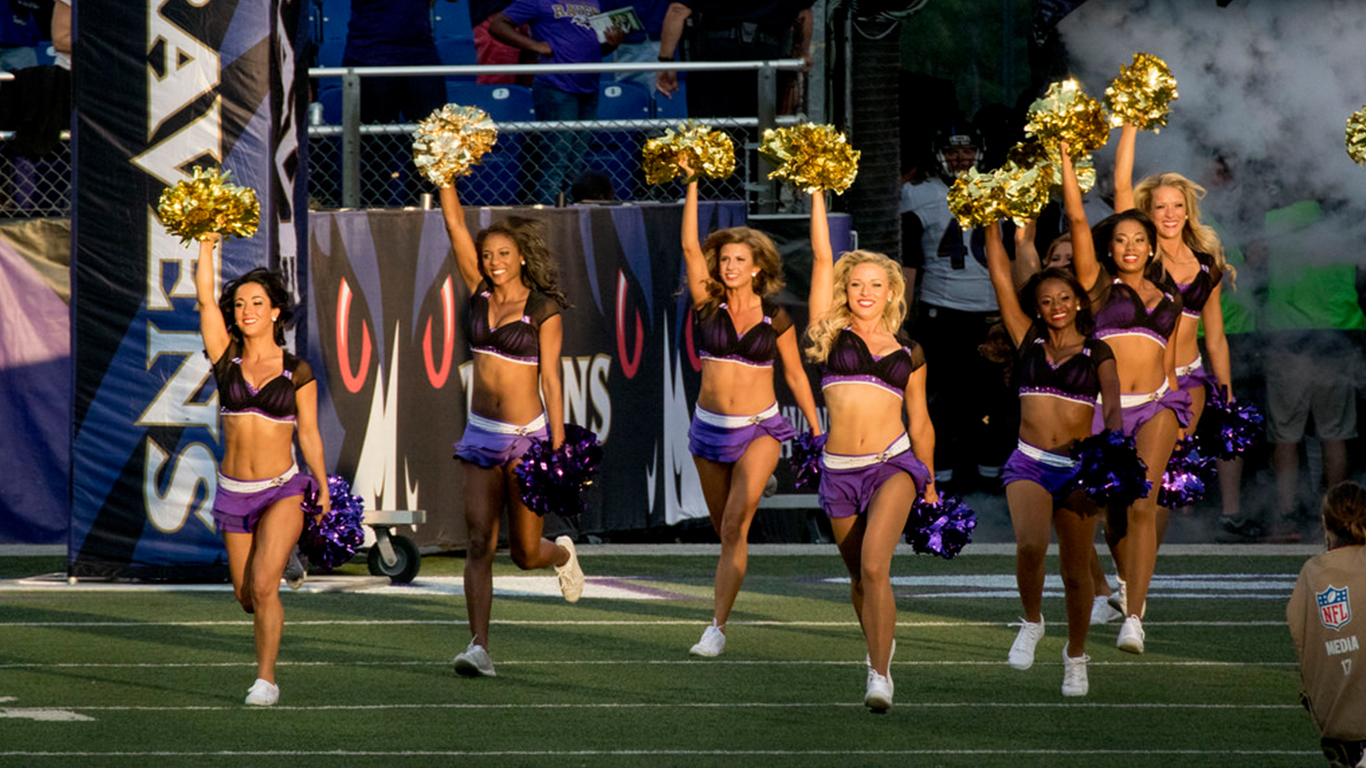
12. Baltimore Ravens
> 2016 pct. stadium filled: 100.1% capacity
> 2016 avg. home attendance: 71,102
> 5-year record: 41W/39L/0T
> Home stadium: M&T Bank Stadium – Baltimore, MD
> 2017 avg. ticket price: $198
From 2008 through 2012, the Ravens won at least one playoff round, culminating in winning Super Bowl XLVII. Since then, the team has only returned to the postseason once, but still managed to keep M&T Bank Stadium packed during the regular season.
[in-text-ad]
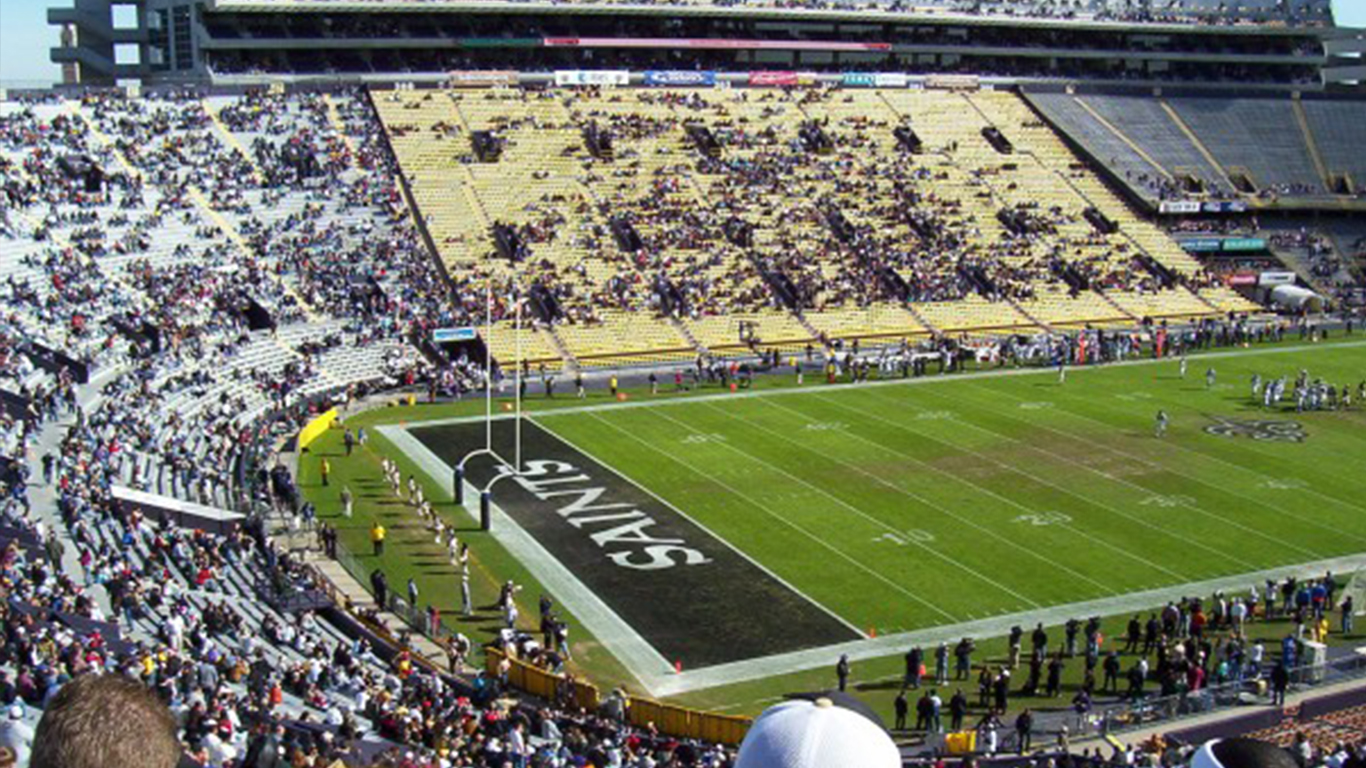
11. New Orleans Saints
> 2016 pct. stadium filled: 100.2% capacity
> 2016 avg. home attendance: 73,109
> 5-year record: 39W/41L/0T
> Home stadium: Mercedes-Benz Superdome – New Orleans, LA
> 2017 avg. ticket price: $199
Though the Saints have gone 7-9 in each of the last three seasons, the team boasts Drew Brees, one of the league’s preeminent quarterbacks. Brees led the franchise to its first and only Super Bowl victory following the 2009 season.
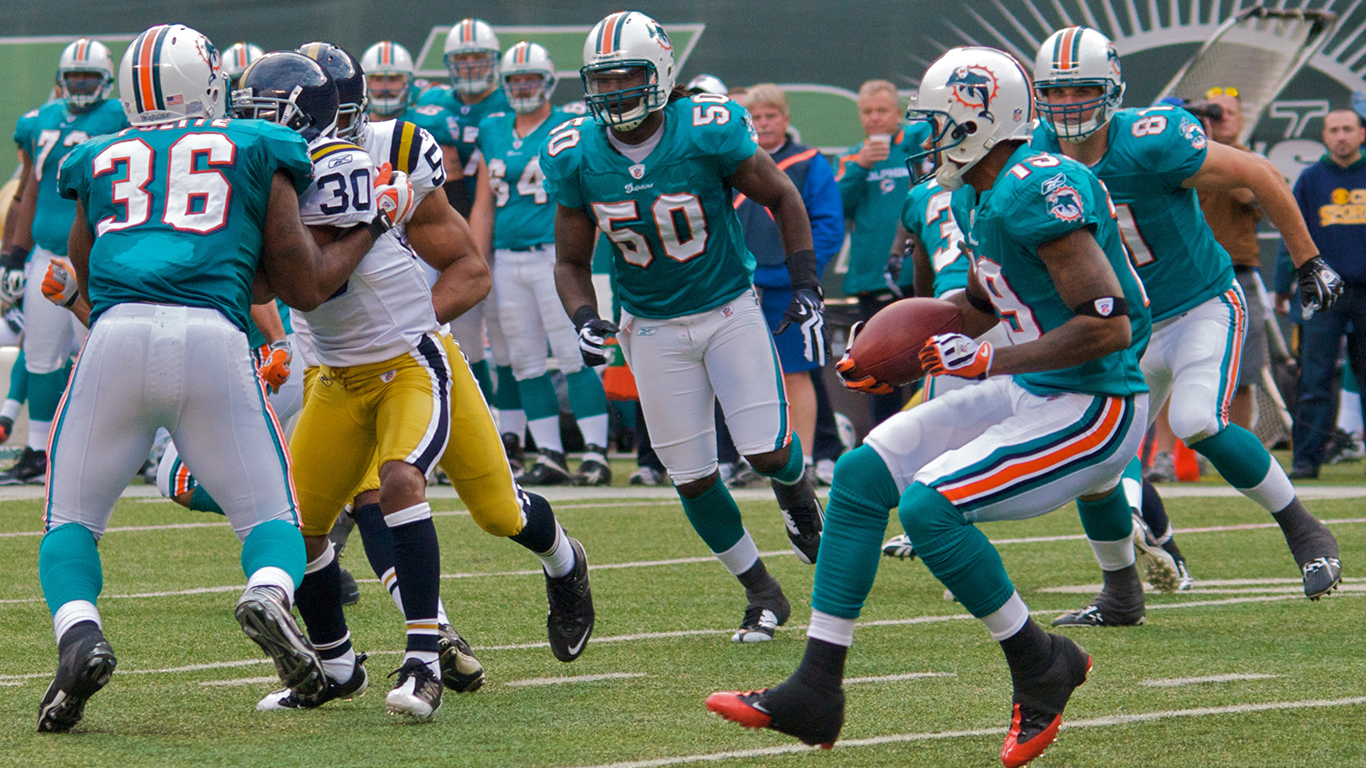
10. Miami Dolphins
> 2016 pct. stadium filled: 100.3% capacity
> 2016 avg. home attendance: 65,512
> 5-year record: 39W/41L/0T
> Home stadium: Hard Rock Stadium – Miami Gardens, FL
> 2017 avg. ticket price: $253
While the Dolphins have been less than successful in recent years — the franchise has made it to the postseason just twice since 2001 — they still ranked among the top 10 in home attendance in 2016. Miami is the eighth largest U.S. metropolitan area.

9. Denver Broncos
> 2016 pct. stadium filled: 100.9% capacity
> 2016 avg. home attendance: 76,774
> 5-year record: 59W/21L/0T
> Home stadium: Sports Authority Field at Mile High – Denver, CO
> 2017 avg. ticket price: $498
Winning tends to drive fans to games, and going into last season, Denver was coming off a triumphant Super Bowl win with now-retired Peyton Manning at the helm.
[in-text-ad-2]

8. Houston Texans
> 2016 pct. stadium filled: 101.1% capacity
> 2016 avg. home attendance: 71,868
> 5-year record: 41W/39L/0T
> Home stadium: NRG Stadium – Houston, TX
> 2017 avg. ticket price: $253
Though the Houston Texans are a relatively new team with no Super Bowl appearances, the franchise benefits from one of the largest home markets of any team in the league.
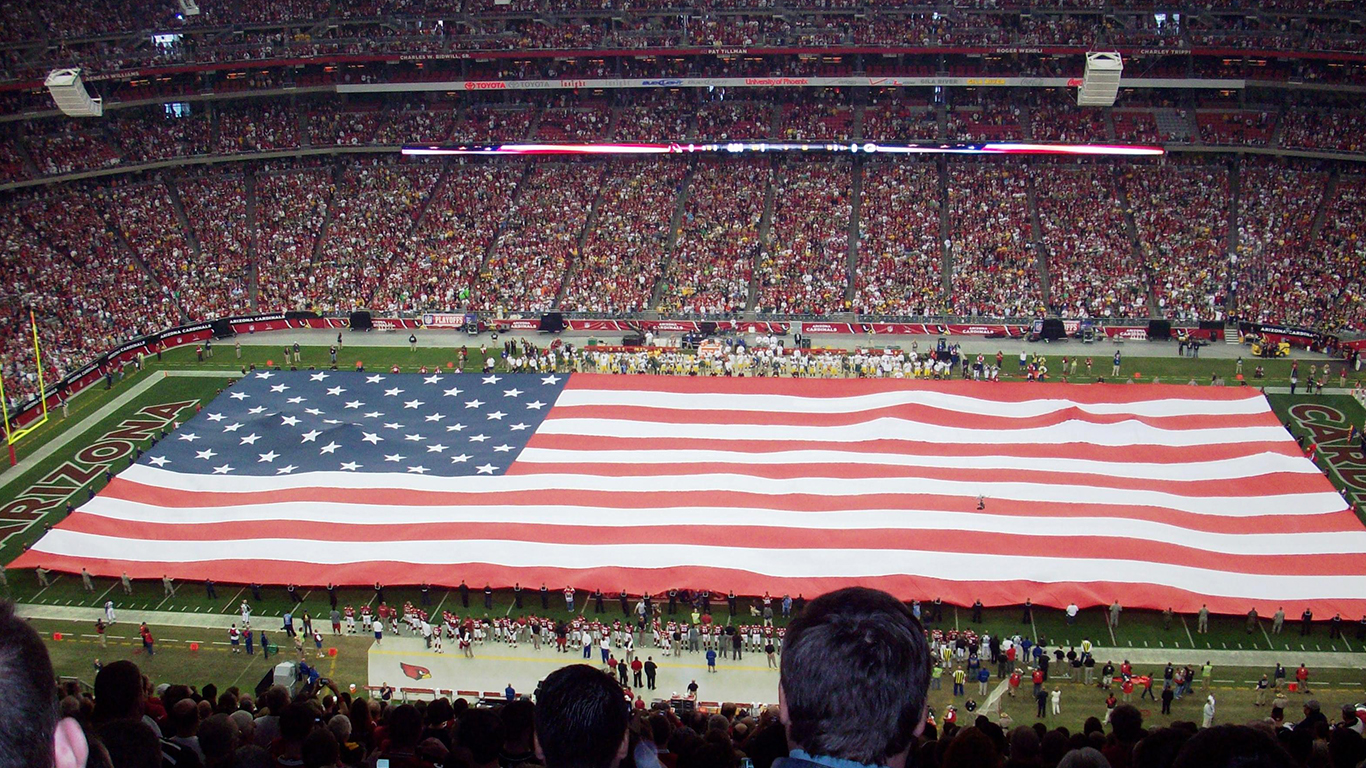
7. Arizona Cardinals
> 2016 pct. stadium filled: 102.3% capacity
> 2016 avg. home attendance: 64,831
> 5-year record: 46W/33L/1T
> Home stadium: University of Phoenix Stadium – Glendale, AZ
> 2017 avg. ticket price: $178
After a strong 13-3 showing the 2015 season, which ended with the the NFC Championship game, many Cardinals fans likely had high hopes for the 2016 season.
[in-text-ad]

6. San Francisco 49ers
> 2016 pct. stadium filled: 102.4% capacity
> 2016 avg. home attendance: 70,178
> 5-year record: 38W/41L/1T
> Home stadium: Levi’s Stadium – Santa Clara, CA
> 2017 avg. ticket price: $224
San Francisco is one of just a handful of teams to fill seats despite a dismal record of late. The team went 5-11 and 2-14 in 2015 and 2016, respective, and yet it ranks sixth on this list.

5. Philadelphia Eagles
> 2016 pct. stadium filled: 103.0% capacity
> 2016 avg. home attendance: 69,596
> 5-year record: 38W/42L/0T
> Home stadium: Lincoln Financial Field – Philadelphia, PA
> 2017 avg. ticket price: $248
Though the Eagles finished their last two seasons with disappointing 7-9 records, the team does not struggle for want of fans. The Philadelphia metro area is one of the largest of any franchise in the league.
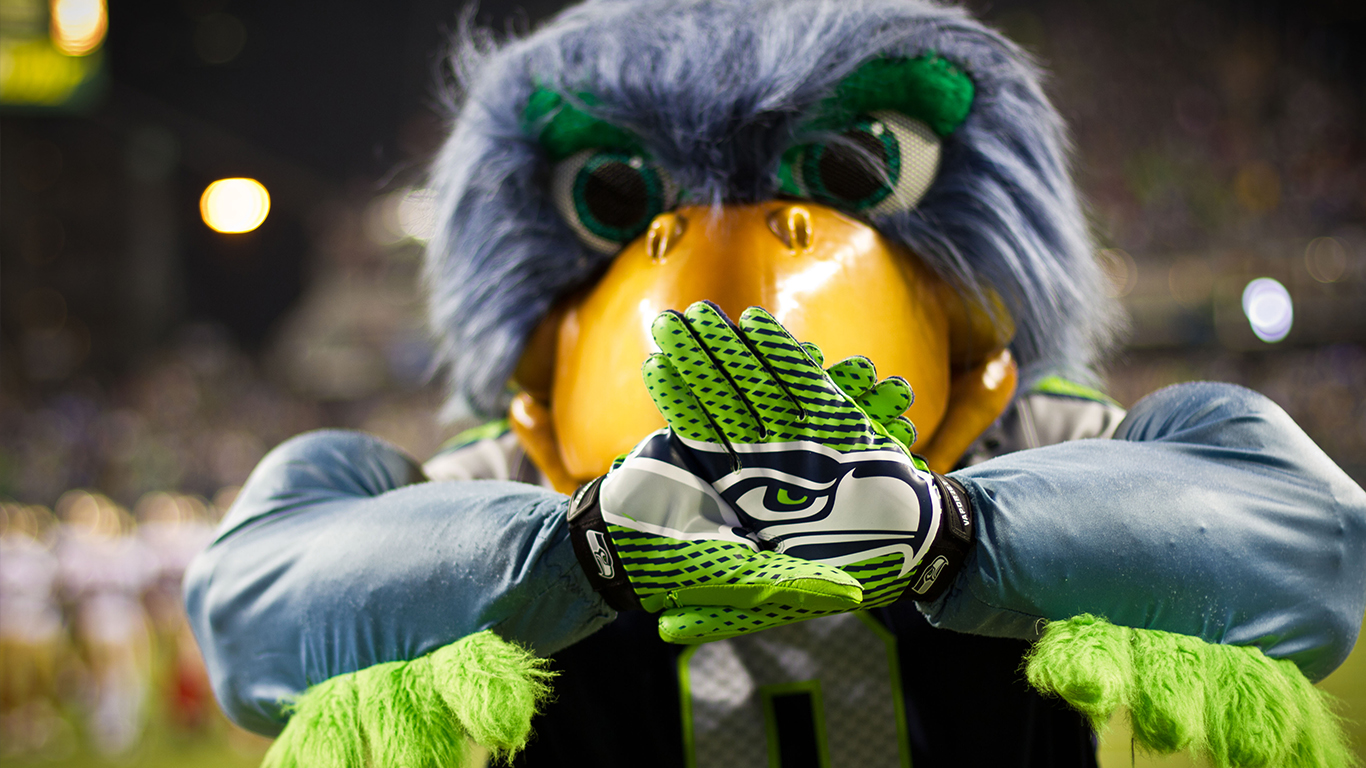
4. Seattle Seahawks
> 2016 pct. stadium filled: 103.1% capacity
> 2016 avg. home attendance: 69,073
> 5-year record: 56W/23L/1T
> Home stadium: CenturyLink Field – Seattle, WA
> 2017 avg. ticket price: $410
The Seattle Seahawks have made it to the postseason in each of the last five years, including two Super Bowl appearances and one Super Bowl Victory.
[in-text-ad-2]
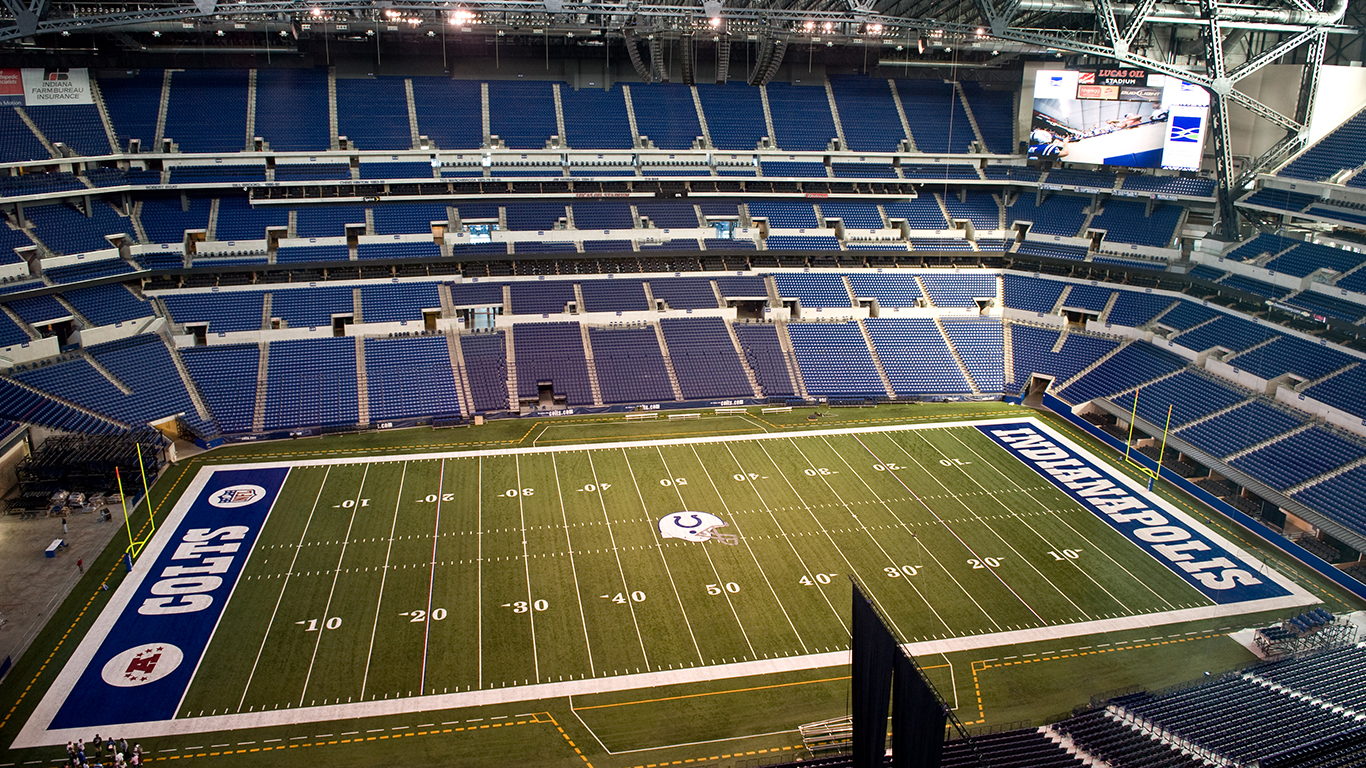
3. Indianapolis Colts
> 2016 pct. stadium filled: 104.0% capacity
> 2016 avg. home attendance: 65,549
> 5-year record: 49W/31L/0T
> Home stadium: Lucas Oil Stadium – Indianapolis, IN
> 2017 avg. ticket price: $155
With relatively inexpensive tickets, as well as Andrew Luck, one of the most promising quarterbacks in the league, the Indianapolis Colts regularly fill Lucas Oil Stadium to beyond capacity.

2. Green Bay Packers
> 2016 pct. stadium filled: 107.3% capacity
> 2016 avg. home attendance: 78,215
> 5-year record: 51W/28L/1T
> Home stadium: Lambeau Field – Green Bay, WI
> 2017 avg. ticket price: $330
Green Bay is by no means a large market. However, given the franchise’s storied history, famous field, recent winning record, and highly-invested fans — the Packers are a publicly-owned team — the team’s strong attendance is no surprise.
[in-text-ad]
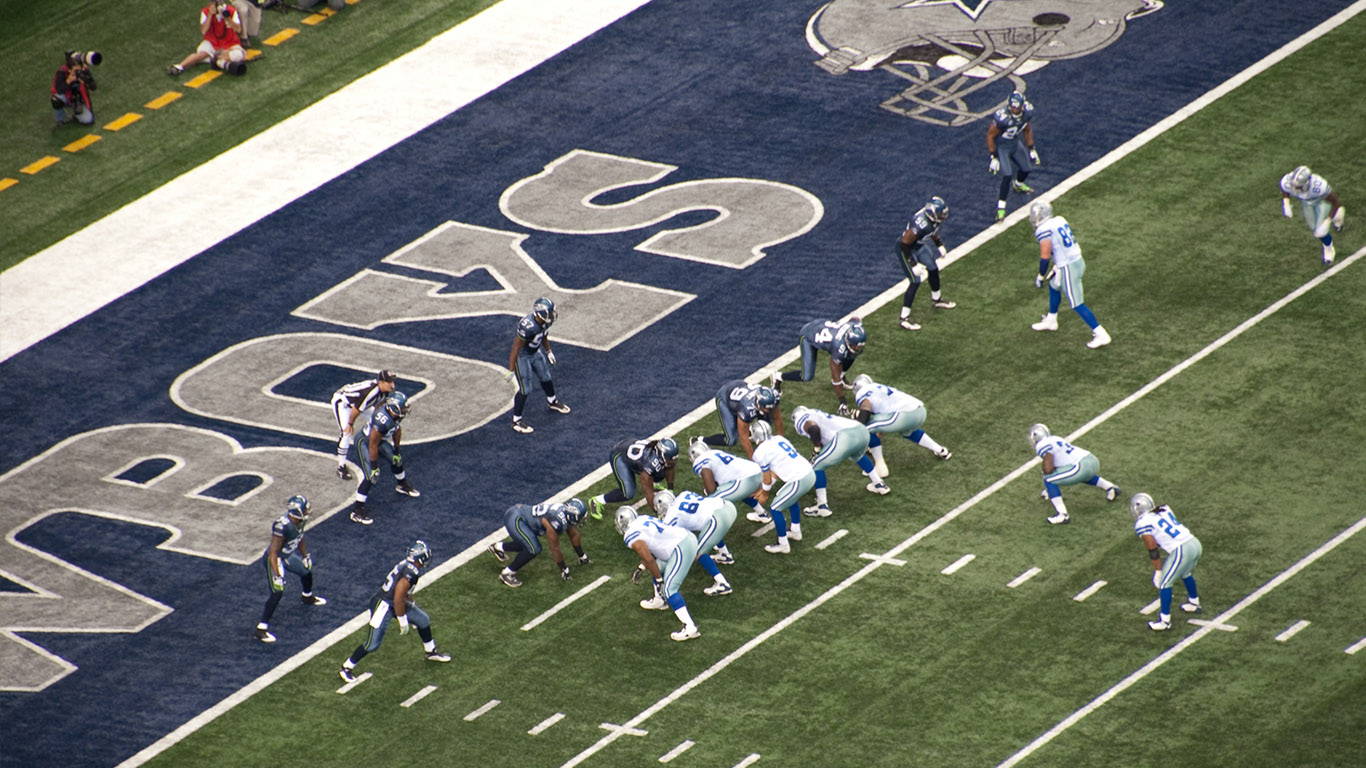
1. Dallas Cowboys
> 2016 pct. stadium filled: 115.7% capacity
> 2016 avg. home attendance: 92,539
> 5-year record: 45W/35L/0T
> Home stadium: AT&T Stadium – Arlington, TX
> 2017 avg. ticket price: $364
No NFL stadium was filled beyond capacity during the regular season more than AT&T Stadium in Dallas last year. The stadium, which opened in 2009 and has a main seating capacity of 80,000 but can be expanded to fit more fans, averaged 92,539 people during the Cowboys’ eight home games. That the team went 13-3 last year likely did not hurt attendance.
The Rams’ move to Los Angeles last year, the Chargers’ move this year, and the Raiders’ planned move reflect the owners’ desire for a larger market in which to sell merchandise and fill seats. All three teams had attendance issues in the years leading up to their move. San Diego only filled 80% of seats at Qualcomm Stadium last year, the worst in the NFL. The year before, St. Louis filled 80% of seats in the Edward Jones Dome, which was the worst that year. The Los Angeles metropolitan area’s population of over 13 million is more than double the combined population of San Diego and St. Louis. Oakland had the lowest average home attendance of any team last year.
A number of factors affect team attendance, but first and foremost is likely the team’s success. While some fans will go to games no matter how well their team is doing, a winning team that seems on its way to making a deep playoff run is more likely to fill more seats than one that seems hopeless.
Indeed, the teams with the best attendance last year have been highly successful over the last few years. The four that had the best attendance records — Seattle, Green Bay, Indianapolis, and Dallas — each had among the 10 best combined records over the last five seasons. The teams with the worst attendance include the Jacksonville Jaguars, Tampa Bay Buccaneers, Oakland Raiders, and Cleveland Browns, each of which has recently been among the worst teams in football.
Methodology:
To identify the least and most popular NFL teams, 24/7 Wall St. reviewed attendance data as recorded by ESPN. Teams were ranked based on average home attendance in 2016 as a percentage of stadium capacity. Average home attendance for 2016 is from ESPN. Average 2017 prices are for the secondary market only, and were provided by TicketIQ, an online aggregator of ticket listings and sales.
Credit card companies are handing out rewards and benefits to win the best customers. A good cash back card can be worth thousands of dollars a year in free money, not to mention other perks like travel, insurance, and access to fancy lounges. See our top picks for the best credit cards today. You won’t want to miss some of these offers.
Flywheel Publishing has partnered with CardRatings for our coverage of credit card products. Flywheel Publishing and CardRatings may receive a commission from card issuers.
Thank you for reading! Have some feedback for us?
Contact the 24/7 Wall St. editorial team.